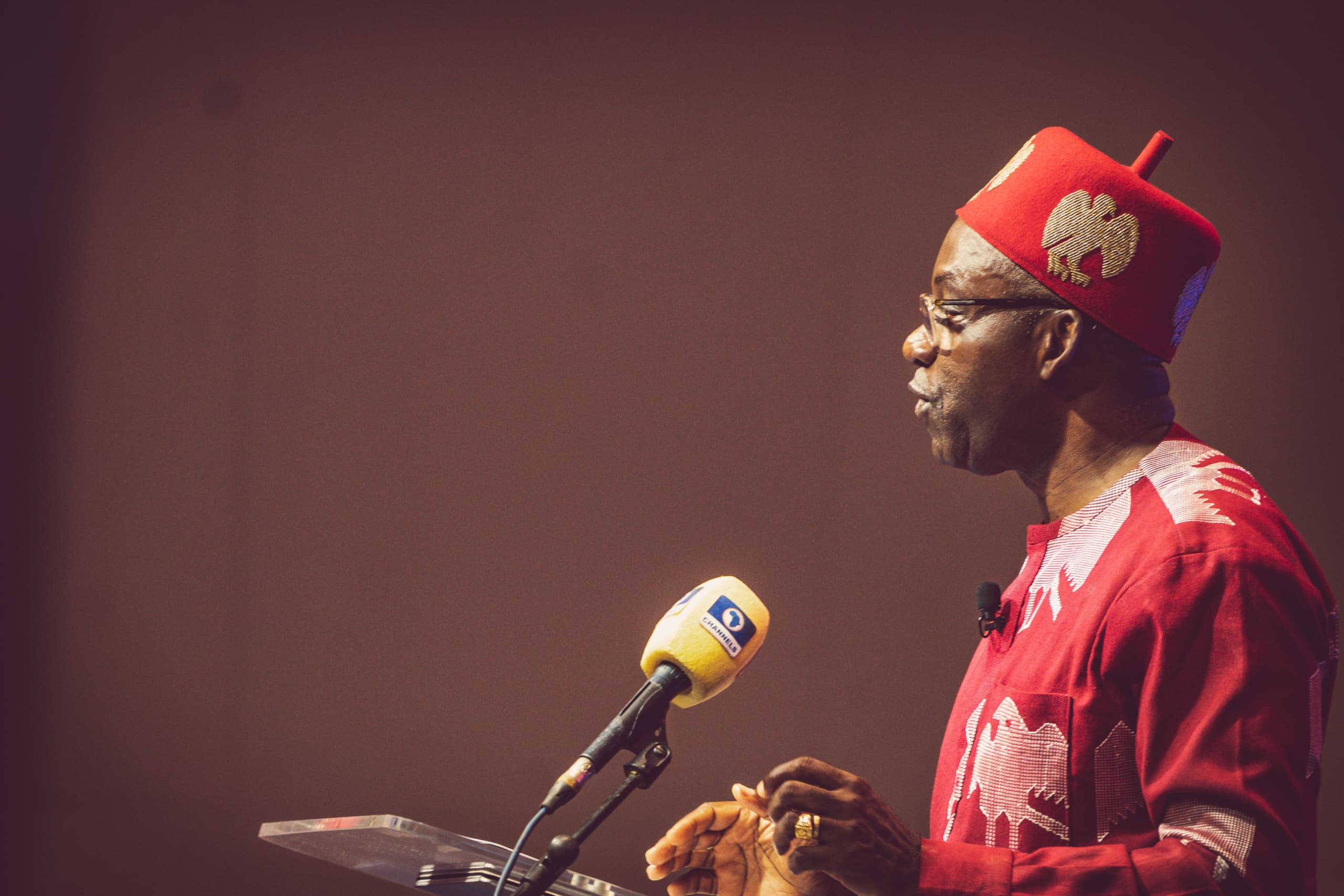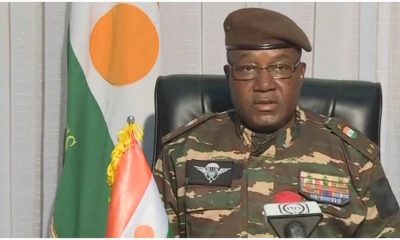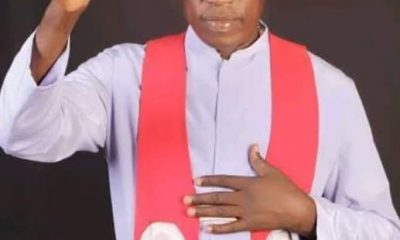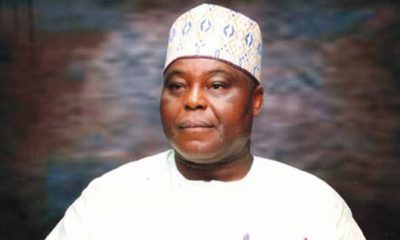Politics
Rochas Okorocha escapes death as gunmen kill Police Officer on his convoy

Former Imo state governor, senator Rochas Okorocha on Sunday disclosed that he escaped death when his convoy was attacked by gunmen.
Okorocha said even though he escaped unhurt, a police officer attached to him was killed by the assailants.
He said the incident occured at the Ihube community on the Okigwe- Enugu expressway which had been under siege by terrorists who had been killing and kidnapping people and travelers for ransom.
The former lawmaker said he was sad that his convoy could be attacked.
Okorocha who spoke at Amaimo in the Ikeduru Local Government Area of the state, at the birthday anniversary celebration of the Peoples Democratic Party candidate for the November 11 governorship election in Imo state, Samuel Anyanwu, said that the killing of the Police Officer was “unfortunate,” adding that he was returning from Enugu after attending the burial ceremony of the wife of a former senate president, Ken Nnamani when his convoy was attacked.
He said that the governor of Enugu state, Peter Mbah had released vehicles and security men to take him and his team to Imo state for the burial ceremony of Ihedioha’s mother and said it was after he had finished attending the funeral ceremony at Mbaise and the convey had dropped him at his Spilbat mansion in Owerri and was heading back to Enugu that they were attacked.
He also said that he was embittered because he was safe in Enugu only to be attacked and a security agent killed in his own state.
He said, “I am angry. I am very angry. I am angry because I spent two days in Enugu and nothing happened to me but it is in my own state that the convoy released to me by the governor of Enugu state (a very good man) to attend the burial ceremony of Ihedioha’s mother at Mbaise that I was attacked and one policeman killed.
“What is happening in Imo state makes me angry. Many people who are running to govern Imo state are not capable but I have seen one man who the cap fits. When it is time I will speak.”

News
Fubara: How not to fight a godfather

In the shadowed coliseum of politics, where the air is thick with the dust of ambition and the echoes of power plays, there stands a figure both revered and feared: the Political Godfather. He is not merely a player in the game; he is the game itself, a labyrinthine maze where every turn leads back to him. To challenge him is to step into an arena where the rules are written in invisible ink, and the referee is his shadow. This is not a battle of strength but of wits, not of force but of finesse. And yet, many have tried to topple him, only to find themselves ensnared in his web. Here is how not to fight a Political Godfather. Fubara should learn from this!
Do Not Charge Like a Bull at a Red Cape
The Political Godfather thrives on confrontation. He is the matador, and every challenger who charges headfirst is a bull destined to stumble. His red cape is the illusion of vulnerability: a scandal, a misstep, or a public slight. But charging at it only reveals your own weaknesses. He will sidestep, and you will find yourself gored by your own momentum. The Godfather’s power lies in his ability to deflect, to make your strength your downfall. Instead of charging, observe. Study the cape, not the man behind it. His true weakness is not in his defenses but in his overconfidence. This isn’t in Fubara’s notes.
Do Not Build Your Castle on Sand.
Many challengers make the mistake of constructing their power base on shaky foundations- alliances of convenience, promises of loyalty, or the fleeting support of the bandwagon masses. The Political Godfather, however, has built his fortress on bedrock. His alliances are forged in the fires of mutual interest, his loyalty bought with decades of favours, and his support entrenched in the very fabric of the system. To challenge him with a castle built on sand is to invite disaster. When the tides of political fortune rise, your castle will crumble, while his remains unshaken. Build your foundation slowly, brick by brick, and ensure it can withstand the storm. Fubara doesn’t know this.
Do Not Underestimate the Power of Patience.
The Political Godfather is a master of time. He knows that impatience is the Achilles’ heel of most challengers. He will wait, biding his time, while you exhaust yourself in a flurry of activity. He will let you make the first move, the second, and the third, all the while studying your patterns, your weaknesses, your tells. By the time he strikes, it will be with surgical precision, and you will be too weary to mount a defense. Patience is not just a virtue in this arena; it is a weapon. Do not rush. Let him grow complacent, and strike only when the moment is ripe. I guess Fubara does know this!
Do Not Ignore the Shadows.
The Political Godfather does not operate in the light. His power lies in the shadows, in the whispered conversations, the backroom deals, the unspoken alliances. To fight him on the open battlefield is to play into his hands. He will lure you into the light, where every move is scrutinised, every word dissected, and every mistake magnified. Meanwhile, he will continue to pull strings from the darkness. To defeat him, you must learn to navigate the shadows. Cultivate your own network of influence, operate in the gray areas, and strike where he least expects it. Fubara did you know this?
Do Not Fight Alone
The Political Godfather is not a lone wolf; he is the head of a pack. His power is magnified by his network of allies, each one a thread in the intricate tapestry of his influence. To challenge him alone is to face not just one opponent but an entire ecosystem. You must build your own coalition, not just of the powerful but of the loyal. Find those who share your vision, who are willing to stand with you not out of fear or favour but out of conviction. Together, you can dismantle his network, thread by thread. Fubara you were all along alone.
Do Not Forget the Human Element.
Behind the facade of power, the Political Godfather is still human. He has fears, insecurities, and vulnerabilities. Many challengers make the mistake of seeing him as an invincible force, a monolithic entity. But even the mightiest oak has roots that can be weakened. Understand his motivations, his desires, his fears. Use them not as weapons but as tools to unravel his power. Appeal to his humanity, not his ego. Sometimes, the most effective way to fight a Godfather is not to fight at all but to outmaneuver him. Tinubu showed this Fubara, but you ignored. Tinubu would be laughing at your illusion.
Do Not Lose Sight of the Endgame.
The Political Godfather’s greatest strength is his ability to manipulate the narrative. He will twist your words, distort your actions, and rewrite the story to suit his agenda. Do not get caught up in the day-to-day skirmishes. Keep your eyes on the endgame. What is your ultimate goal? Is it to defeat him, or to create something greater? The Godfather thrives on chaos; he will try to drag you into his world of intrigue and deception. Stay focused on your vision, and do not let him dictate the terms of the battle. Fubara was carried away by executive power- hubris!
In the end, the Political Godfather is not just a person but a symbol. To fight him is to fight the very system that sustains him. But with patience, strategy, and a clear vision, even the mightiest Godfather can be brought to his knees. The key is not to fight him on his terms but to rewrite the rules of the game itself.
Source: Spearnews
News
Soludo: A Pragmatic Economist and Statesman for Nigeria’s Future

By Christian ABURIME
In a riveting address delivered at The Platform, a special national policy dialogue celebrating Nigerian democracy on June 12 in Lagos, Anambra State Governor, Professor Chukwuma Charles Soludo, CFR, perceptively dissected national issues and articulated a compelling vision for Nigeria’s economic and political future. Invited as one of the guest speakers, Governor Soludo did not just show up as a governor, but as an erudite public intellectual and hands-on leader, as he displayed the rare combination of brilliant economic insights and statesmanlike vision that Nigeria desperately needs.
His speech on the subject of Sustainable Democracy and Free Market Economy touched base with the contemporary challenging times, highlighting his profound understanding of Nigeria’s economic challenges and presenting a roadmap for national recovery. With a depth of knowledge honed over decades as an academic, international consultant and former Central Bank governor, Prof. Soludo diagnosed the deep-rooted ills afflicting Nigeria’s battered economy with clinical precision.
He exposed the structural flaws, policy inconsistencies, and lack of productivity that have turned a potentially prosperous nation into a staggering giant struggling under a mountain of debt. In the end, he also propounded solutions in such a way that any dispassionate listener would come away with a genuine impression that Governor Soludo’s comprehensive diagnostic approach and exemplary leadership qualities underscore his potential as the pragmatic, paradigm-shifting leader Nigeria needs in the near future.
Prof. Soludo, with his illustrious academic background and distinguished career, has always been an icon of intellectual rigour and policy innovation. His tenure as the Governor of the Central Bank of Nigeria is still remembered for the significant reforms that stabilised the banking sector. Soludo’s deep-seated knowledge of economic principles and his pragmatic approach to policy-making were evident in his Platform speech. Some of his remarks are as profound as they are reflective of the man’s depth of mind. A few quotes from his speech will suffice.
On the dynamics of democracy and free market economy, Soludo said “It needs to be emphasized however that democracy and market economy are dynamic and permanent work-in-progress, requiring constant contestations among interest groups in the struggle towards a more perfect society.” He continued, “The state of the economy is therefore the determinant of enduring democracy, and for most people, democracy is a key pre-requisite for sustainable economic transformation. Democracy and, indeed, any form of governance must deliver tangible social and economic benefits to the generality of the citizens to be credible and sustainable.”
On admitting the reality of Nigeria’s true economic condition, Prof. Soludo was downright frank: “Let’s admit a fact which most Nigerians don’t seem to appreciate. Nigeria is a very poor country, and its public finance is broken. This admission is critical to any reasonable discourse on the road ahead.” To fix the broken public finance, Soludo implied thus: “Given the humongous infrastructure deficit, the consolidated public sector (FGN and States) capital spending should be at least 10-15% of GDP per annum. Currently, it is less than 5%. Indeed, the entire budget of the FGN is probably less than 30% of what we need to be investing in infrastructure per annum.”
On economic solutions, Soludo went further to emphasize thus: “There is an emergency, and incremental changes won’t cut it. Intentional systemic disruptions are urgently needed but it requires mass mobilization and ownership by the public. Suffice it to say that fixing the systemic insecurity, broken public finance and economy, broken oil and gas sector, infrastructure and environmental decay, rising social tensions, and restoring hope and confidence of the citizens would require us to try several roads not travelled – thinking and acting without any box!”
But how does Soludo see the efforts of the current president in tackling the volatile economy? Hear him: “I believe that President Tinubu (the man who fought the FGN to a standstill over the power of Lagos State to design the local government system of its choice, championed the fundamentals of true federalism 2003-2007, and tamed the Atlantic Ocean) has the knowledge and courage to mobilize Nigeria to cross over the current crossroads. There are no easy or quick fixes, and he needs our collective support.”
Reflecting his own empathetic nature, sensitivity and emotional intelligence as a leader, Soludo expressed a most touching thought on the current hard times most Nigerians are facing: “As a person, I deeply feel the pains of all Nigerians at these challenging times, especially the over 100 million Nigerians who are multi-dimensionally poor. Times are hard. Sometimes I wish that I can give every resident of my state N1 million each to cushion the effects of the hard times.”
But the professor of economics is more than just an economic theorist – he is a leader taking bold actions to put his ideas into practice in Anambra State. Since assuming office over two years ago, he has led by example through prudent spending, patronising made-in-Nigeria products, and displaying genuine empathy for the common man. His commitment to social justice is a cornerstone of his governance philosophy, making him a leader who truly understands and addresses the needs of his people.
According to Soludo, addressing the needs of common Nigerians “will require a fundamental reordering of national priorities to invest massively in social programs (especially health, education and social protections) as well as infrastructure to give everyone a stake in the national cake, thereby securing the future. I am an Awoist and a true progressive on this front.” In fact, Soludo’s Awoist priorities are re-establishing social services in education where he has employed thousands of quality teachers and abolished tuition fees; in healthcare where more personnel are being employed and pregnant women enjoy free antenatal care; in economic security for the senior citizens and underprivileged; and in infrastructural development – all without resorting to piling on more debt.
Nigeria’s economic malaise is quite convoluted and Governor Soludo’s analysis of the woes was extraordinarily incisive. Over and over, he identified structural deficiencies, rampant corruption, and over-reliance on oil revenues as key impediments to economic stability. His critique was not just a lamentation of Nigeria’s economic troubles but a call to action. Soludo emphasized the need for economic diversification, robust governance frameworks, and an enabling environment for entrepreneurship and innovation. His insights reflect a deep understanding of the interconnectedness of economic policies and social outcomes, and the impact on our democracy.
Again, in an era where public trust in leadership is waning, Governor Soludo exemplifies integrity and accountability. His prudent fiscal management in Anambra State offers an exemplary model in transparency and efficiency. By prioritizing locally-made products, Soludo not only supports Nigerian industries but also fosters a sense of national pride and self-reliance. His administration’s fiscal discipline, avoiding excessive borrowing, demonstrates a responsible approach to governance that prioritizes long-term stability over short-term gains. Little wonder, Anambra State under his leadership has been rated one of the top 5 fiscally sustainable states in Nigeria, according to BudgIT.
One of the defining characteristics of Governor Soludo is his unwavering political will to implement bold reforms. His tenure so far as Anambra State’s governor is marked by decisive actions that, while sometimes unpopular, are necessary for sustainable progress. At the risk of repetition, Soludo’s stance against needless borrowing to fund government activities is a courageous deviation from the norm, reflecting his long-term vision for financial independence and economic sovereignty. His leadership style is characterised by a fearless pursuit of policies that ensure a resilient and self-sufficient economy.
As Nigeria grapples with multifaceted challenges, the need for future perceptive leaders and profound thinkers like Professor Charles Soludo has never been more apparent. His blend of academic excellence, practical governance experience, and compassionate leadership positions him uniquely as a statesman capable of steering Nigeria towards a prosperous future. Soludo’s vision for a sustainable democracy and a thriving free market economy offers a blueprint for national recovery and growth. His emphasis on prudent spending, local patronage, social security, ethical reset and fiscal responsibility encapsulates the principles of good governance.
Of course, Nigeria has no shortage of brilliant thinkers and economists diagnosing its woes. But the nation is desperately short on statesmen willing to walk the difficult path of reform and restructuring rather than taking the easy road of corruption and deficits. In Governor Soludo, Nigeria may have found a future leader with both extraordinary intellect and the fortitude to transform his ideas into reality through hard work and political vision.
At times of low morale when citizens need inspiration, Soludo also shows that he is a leader who doesn’t give up. Hear him: “I am an incredible optimist in the potential greatness of this blessed country. That’s essentially why I have persisted in public service and applied for my current job. I believe in the infinite possibilities and opportunities that Nigeria presents. Our youthful population, if unleashed, will definitely conquer the world and the 22nd Century will be Nigeria’s century.”
As Nigeria looks to the future, it should hold up Governor Soludo as a model for the type of transformative yet principled leadership it needs to achieve sustainable democracy wedded to free market prosperity. An accomplished scholar and public servant, Soludo represents hope that Nigeria can rise to its full economic potential by finally having a combination of a brilliant economic diagnosis, empathetic leadership, self-sacrificing prudence, boldness of action and the pragmatic prescription to cure what ails it.
Christian Aburime is the Press Secretary to Governor Soludo.
News
2027: El-Rufai visits national secretariat of SDP

Speculations that former governor of Kaduna State, Nasir El-Rufai is gearing up to challenge President Bola Tinubu in 2027 is beginning to make sense as the former FCT Minister on Wednesday visited the Abuja National Secretariat of the Social Democratic Party, SDP.
He was there to pay consultation visit to the National Chairman of the party, Alhaji Shehu Musa Gabam.
He was nominated for a ministerial position in President Bola Tinubu’s administration but was not confirmed by the Senate.
El-Rufai, a chieftain of the ruling All Progressives Congress, APC, was on the campaign train of Tinubu during the 2023 presidential election.
After the election, President Bola Tinubu nominated him for ministerial appointment but the Senate refused to clear him, on grounds of security information.
-

 News2 years ago
News2 years agoBreaking: Tinubu’s authentic ministerial nominees
-

 News2 years ago
News2 years ago“Anytime we want to kill terrorists, President would ask us to take permission from France but they were killing our soldiers-” Niger Republic coup leader
-

 News1 year ago
News1 year ago“I’m leaving the Catholic church because Bishop Onah is oppressing me,” says Okunerere
-

 News2 years ago
News2 years agoDokpesi and the Gazebo Mystique
-

 News2 years ago
News2 years agoRadio Nigeria’s veteran broadcaster Kelvin Ugwu dies three months after retirement from service
-

 News11 months ago
News11 months agoPersons against Allagoa’s reforms behind protests at NSITF
-

 News2 years ago
News2 years agoTsunami: Tinubu orders dissolution of managements, boards of MDAs, to sack all Buhari’s political appointees
-

 News2 years ago
News2 years agoLast minutes fever: Nigerian Hunters Service optimistic as Buhari signs five Bills into law
